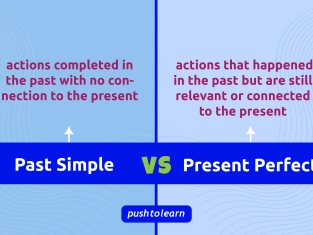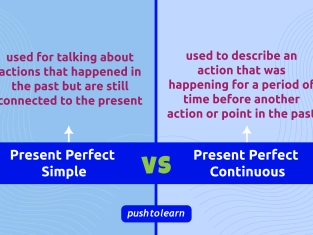by PushtoLearn
Present Perfect
Table of Contents
Present Perfect - Exercises
These exercises focus on Present Perfect
What is the Present Perfect Tense?
We use the Present Perfect tense to talk about:
-
Actions that started in the past and continue now
-
I have lived in London for five years. (I still live there.)
-
Past experiences (without saying when they happened)
-
She has visited Japan. (No specific time.)
-
Actions that just happened (recent past)
-
I have just finished my homework.
-
Actions that happened in the past but affect the present
-
He has lost his keys. (He still doesn’t have them.)

How to Form the Present Perfect
The formula is:
[Subject] + [have/has] + [past participle]
|
Subject |
Helping Verb (have/has) |
Past Participle |
|
I |
have |
seen |
|
You |
have |
eaten |
|
He/She/It |
has |
gone |
|
We |
have |
done |
|
They |
have |
written |
Examples:
-
I have seen that movie before.
-
She has finished her work.
-
We have never been to Paris.
Past Participle – What Is It?
The past participle is the third form of a verb. Some verbs follow a regular pattern (-ed ending), but many are irregular.
|
Base Verb |
Past Simple |
Past Participle |
|
walk |
walked |
walked |
|
eat |
ate |
eaten |
|
go |
went |
gone |
|
write |
wrote |
written |
|
see |
saw |
seen |
See also Irregular Verbs
Common Time Expressions Used with Present Perfect
|
Time Expression |
Example |
|
Ever (in questions) |
Have you ever traveled abroad? |
|
Never (negative experience) |
I have never tried sushi. |
|
Just (very recent action) |
She has just arrived. |
|
Already (before expected) |
They have already finished their work. |
|
Yet (in negative sentences/questions) |
Has he called you yet? / I haven’t finished yet. |
|
For + duration |
We have lived here for 10 years. |
|
Since + point in time |
She has worked here since 2015. |
Present Perfect vs. Past Simple
One common mistake is confusing Present Perfect with Past Simple.
|
Situation |
Present Perfect |
Past Simple |
|
No time mentioned |
I have visited Spain. |
incorrect) |
|
Specific time mentioned |
(incorrect) |
I visited Spain in 2020. |
|
Still true now |
She has lived here for 5 years. (She still lives here.) |
She lived here for 5 years. (She does not live here now.) |
Common Mistakes
1. Using the past simple instead of present perfect
Incorrect: I have seen that movie yesterday.
Correct: I saw that movie yesterday. (Specific time → Use past simple.)
2. Forgetting "has" or "have"
Incorrect: She finished her work.
Correct: She has finished her work.
3. Using "since" with a duration
Incorrect: I have lived here since five years.
Correct: I have lived here for five years.
Present Perfect in Everyday Life
-
At work: I have sent the email.
-
Traveling: Have you ever been to Italy?
-
Daily life: I have lost my keys!
-
Talking about experiences: She has never tried sushi.
FAQs about Present Perfect
When should I use Present Perfect instead of Past Simple?
Use Present Perfect when the action has a connection to the present (I have lost my keys → I still don’t have them). Use Past Simple when the action is finished and in the past (I lost my keys yesterday).
What is the difference between "since" and "for"?
-
I have lived here since 2010. (Starting point)
-
I have lived here for 10 years. (Duration)
Can I use Present Perfect with specific time expressions?
No, never use yesterday, last year, in 2020 with Present Perfect. Use Past Simple instead.
Why do we use "ever" in questions?
"Ever" is used to ask about life experiences (Have you ever met a celebrity?).
Can I use Present Perfect in negative sentences?
Yes! Just add not after “have/has”:
-
She has not finished her work.
-
I haven’t seen that movie.

